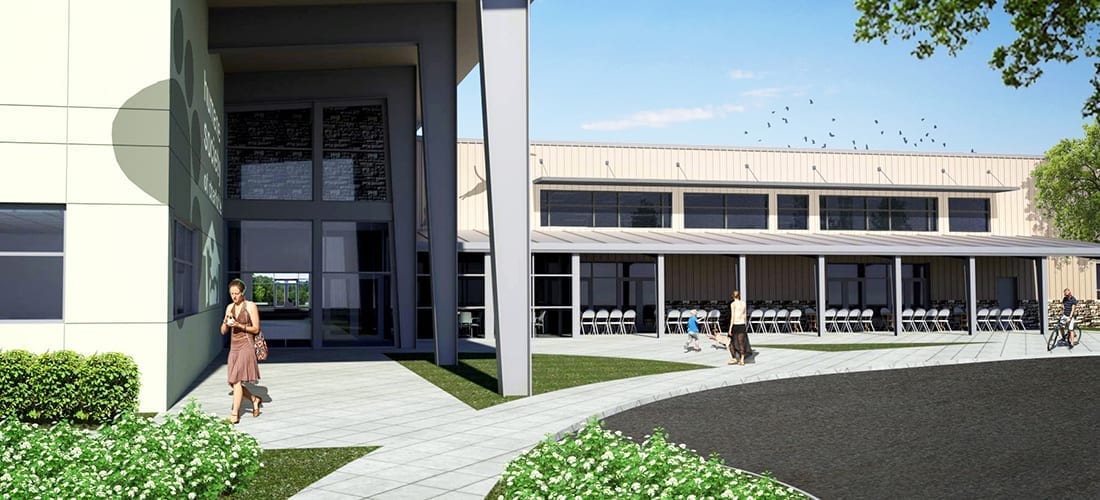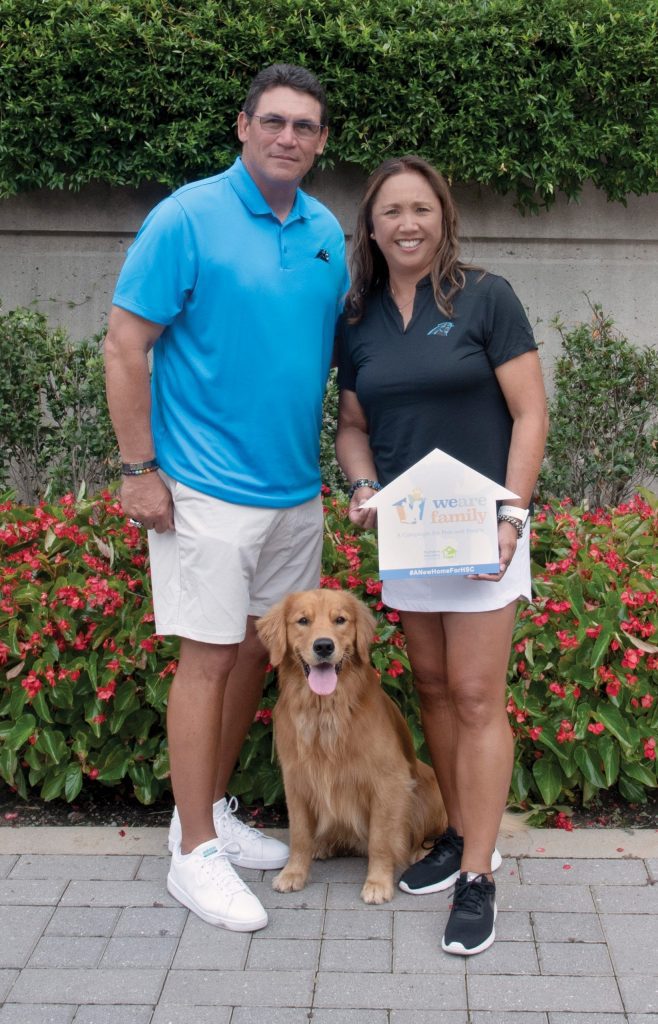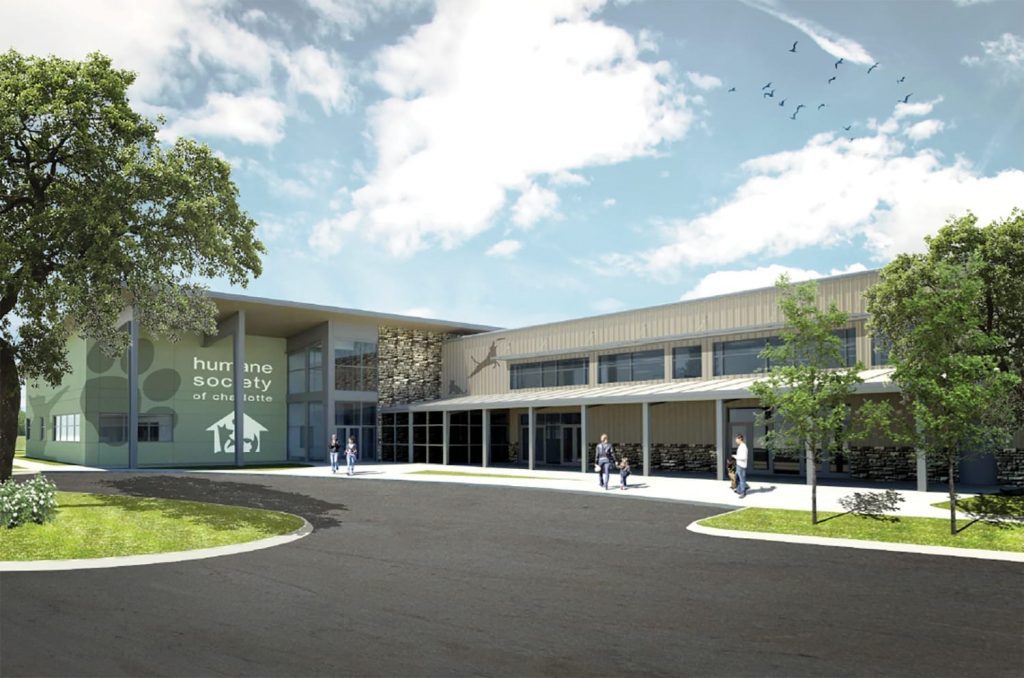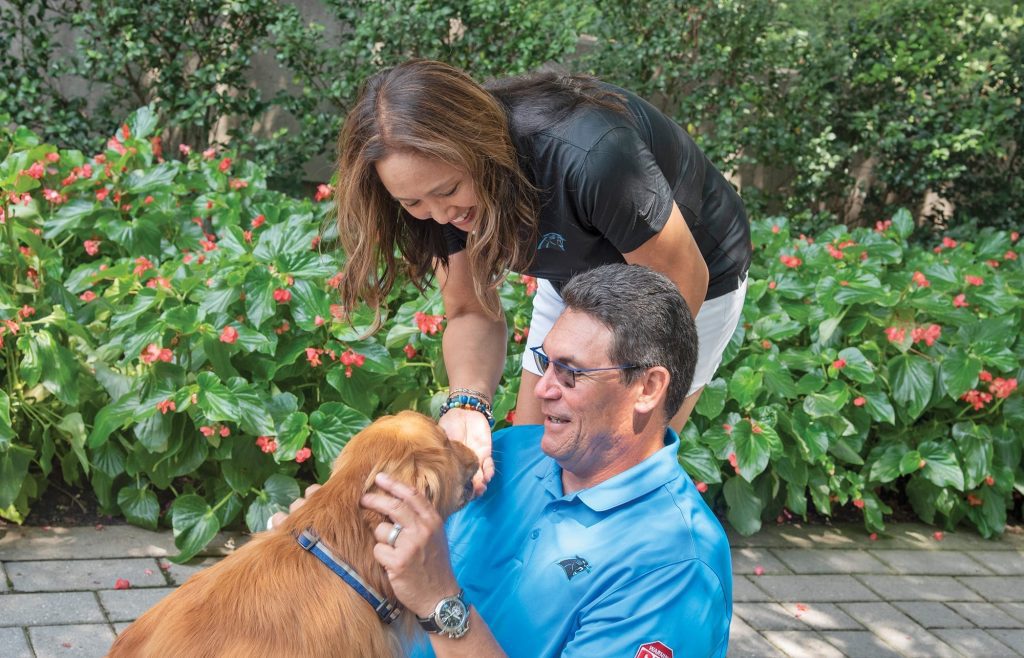Passion for pets
December 2, 2019

With plans for a new modern campus — and a little help from Ron and Stephanie Rivera — the Humane Society of Charlotte aims to strengthen bonds between pets and people.
By Cathy Martin
It’s a Wednesday, so there are lots of cars in the parking lot at the Humane Society of Charlotte on Toomey Avenue, about 2 miles southwest of the center city. It’s also pouring down rain, but that doesn’t matter. Every week, for four hours, the organization hosts a low-cost clinic for pet owners to bring in their pups and kitties for vaccines, heartworm checks, microchips and other routine care they might not be able to afford elsewhere. The wellness clinic serves about 100 clients a week.

“Because we don’t have a physical facility, they wait outside. They’re over there in the rain waiting to receive care,” says Shelly Moore, president and CEO of the local Humane Society chapter since 2010.
The aging facility — actually a cluster of buildings, mostly covered outdoor structures — was built by the city in the late 1970s for animal control. The Humane Society of Charlotte — which is not affiliated with the Humane Society of the U.S. — moved there in 1993. But the 9,960-square-foot campus itself was never designed to support the organization’s no-kill philosophy of rehabilitating and rehoming animals.
Now, with the help of Carolina Panthers head coach Ron Rivera and his wife, Stephanie, the Humane Society of Charlotte is looking to raise $15 million to build a new animal resource center to better focus on the nonprofit’s mission of treating and finding new homes for animals. The new funds would also help add training and children’s programs and other new services at the new site about a mile from the current campus.
The Riveras are the honorary co-chairs of the nonprofit’s “We are Family” fundraising campaign, which as of mid-November had reached about $11.2 million toward its goal. The couple got involved with the Humane Society shortly after they moved here in 2011.
“We saw all the things that the Humane Society was doing all over town, and I was impressed by how much they did,” Stephanie Rivera says. After a little more research and attending events such as the organization’s annual Pet Palooza pet walk, the Riveras offered to lend a hand. Since then, they’ve hosted events, secured sponsorships and facilitated photo shoots for calendars featuring Panther players, with proceeds from sales benefiting the Humane Society.
“It wasn’t until later that I saw the facility and I thought, oh my gosh, they do so much with so little,” Rivera says. “It wasn’t just the pet adoptions, but it was the dog runs they were doing, their [work with animals rescued from] puppy mills, the health care once a week. I thought, once a week is awesome, but it would be great if they could do it more than once a week.”
In addition to the expanded clinic, the 46,000-square-foot campus will feature a dog park, a cat cafe and an education center to host training classes, school field trips, summer camps and more. More importantly, it will bring the facility up to standards of other Humane Society chapters — even those in smaller cities such as Asheville and Chapel Hill have more modern, state-of-the-art buildings, Moore says.

“For a community like this to not have a top-flight facility is very surprising,” Rivera says.
While the age and deterioration of the current building are factors, Moore says there are other challenges.
“[The current facility] was really never designed to house animals for adoption, period,” she says. “In the ’70s, 20,000 animals a year were coming through this building. Those animals were only staying 72 hours, and then they were euthanized. They weren’t concerned about noise levels, disease control, stress on the animals.”
Since that time, the shelter animal population in Charlotte has decreased, with fewer than 10,000 animals coming into city shelters each year, Moore says. (The Humane Society accepts owner surrenders and also receives transfers from municipal shelters when they run out of space.) One reason for the decrease is improved access to low-cost spay and neuter services. Another factor is social media, as people are able to find new homes for animals or reunite lost pets with owners via sites such as Nextdoor and Facebook.
“What has also shifted is our population of animals coming into the shelters has changed significantly,” Moore says. “We don’t see a lot of puppies or kittens or small fluffies anymore.”
Currently, about 76% of shelter pets in Charlotte are adopted, Moore says. To be considered a “no-kill” community, that figure needs to reach 90%. “But as you get closer to that 90%, they’re harder-to-place animals,” she says, particularly feral cats and midsize to large breed dogs with behavior and/or medical issues.

“You’re not getting those highly adoptable animals that fly out the door in 24 hours, so your length of stay for those pets is a little longer. You have to make sure they don’t deteriorate in your care.”
Kennels at the existing facility, which can house as many as 120 animals, are side-by-side, separated by a chain-link fence. The average length of stay is nine days, says Emily Cook, the society’s marketing and communications manager. At the new center, each animal will have its own room with clear glass windows that will reduce sound and stress. Dedicated adoption counseling rooms will allow prospective owners to interact with the animals.
With fewer animals moving through shelters in recent years, services provided by the Humane Society have evolved.
“A lot of our work has shifted and focused on retention of that human-animal bond — providing assistance to people in crisis, like through our food bank, access to affordable veterinary care — which is a big component of what we’re doing in the new building — and also those education and training opportunities for not just people with pets but for children to create a more humane future for our community,” Moore says.
“Our whole vision is not that we were going to build a shelter or recreate what we have here,” she says. The goal instead is to create a community resource center to support pet lovers and make it easier for people to keep pets in their homes. Training programs could include everything from how to housebreak your new puppy to basic behavior. “You look at the reasons people give up pets, you want to mitigate that by providing resources to people to help solve those problems,” Moore says.
The 60-employee organization is largely dependent on volunteers for everything from walking dogs to data entry. Still, given the size and conditions at the current center, the group is unable to accommodate all the requests from parents and children who want to volunteer.
“Kids and animals are a natural fit. There’s been a lot of research that’s shown when animals are the topic of anything educationally, kids are more focused on it,” Moore says.
“Having a place where they can come and learn and volunteer is my goal. A place where they can feel comfortable, with after-school programs and kids camps, and just learn those basic character traits that we want all kids to have — compassion, responsibility, empathy and kindness — that can be facilitated through interacting with animals and learning about animals,” she says.
The Humane Society is targeting June 30 as an end date for its fundraising campaign, with construction then expected to take about a year.
“You know, I think about quality of life for the city of Charlotte — just take animals out of it for now — and you want to be proud of the city that you live in,” Moore says. “And you want us to value living beings. People and animals are part of that. I think if we can elevate the stature of animal welfare in this community, it creates a more humane community and quality of life for people.”
Improving access to care and training is a start. Unlike the current facility, which only offers wellness clinics for four hours a week, the new center will have three exam rooms that will be open every day.
“And people won’t have to wait outside in the rain,” Rivera says. SP
Click here for more information on The Humane Society of Charlotte’s “We are Family” campaign.

